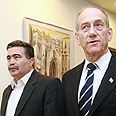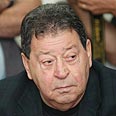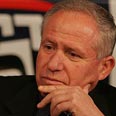


Peretz: Lebanese army won't approach border
Defense minister says IDF will not allow Lebanese army to approach border with Israel until multinational force deploys in area. As for harsh public criticism over war's results, Peretz says proper deployment of multinational force with 15,000 troops can change public opinion. 'Our duty is to prepare for next round,' he stresses
"We will not allow Hizbullah to approach the border with Israel again," he said.
As for the harsh public criticism on the war's outcomes and achievements, the defense minister said that the proper deployment of the multinational force with 15,000 troops could change public opinion and lead to an understanding of the operation's accomplishments."
"The points noted as failures along the way will be examined. We will look into them, put them on the table. Our duty is to prepare for the next round," the defense minister stressed.
He added that "if a multinational force deploys in southern Lebanon and we find ourselves opposite a demilitarized area, then we have reached our goals."
Referring to the Iranian issue, Peretz said that the international community was ignoring the immediate Iranian involvement in the rehabilitation of southern Lebanon, which includes transferring Iranian funds to the population.
At the start of the meeting, Peretz mentioned the idea he had come up with at the beginning of the war, according to which an international economic force must be established to fill the vacuum created in southern Lebanon in order to prevent the arrival of Iranian money that will renew Hizbullah's grip in the area.
"The international economic force needed to rehabilitate Lebanon is critical," the defense minister said.
He added that "the war was imposed on us and we must deal with a series of issues which have not been properly examined in the past. Simultaneously, we will insist that the Security Council fulfills its part."
The defense minister stressed that the Israel Defense Forces was not committing any act violating the ceasefire. He added that although Hizbullah was presenting itself as a winner, "if one looks at the facts, there is not doubt that the State of Israel won."
Peretz rejected the calls for a swift withdrawal of the IDF from Lebanon.
"Our duty is to demand the implementation of the Security Council resolution, and simultaneously support it with our own military preparation before we leave," he said.
Ben-Eliezer: Next round in a few months
Minister of National Infrastructure Binyamin Ben-Eliezer warned that "the next round" of fighting against Hizbullah could be held within several months.
"You have to read between the lines. Hizbuallh is getting organized, the Syria army is learning lessons. We have to rehabilitate the north, the reserve forces and the army and be prepared for the next round," Ben-Eliezer said at the cabinet meeting.
Prime Minister Ehud Olmert told the ministers at the meeting: "I already spoke to the attorney general on the issue of an inquiry into the fighting in Lebanon. In the coming days I will report to the government about the pattern in which the inquiry will be held."
Senior officials in Jerusalem said after the cabinet meeting: "There will be no official investigation committee, there is no need for that, in spite of the fact that the prime minister has yet to announce whether he supports the establishment of such a committee or not."
Minister Avi Dichter called to allow the army to hold professional inquiries.
"We must not allow a situation in which every investigation committee established will prevent the IDF from holding internal inquiries. It must immediately hold an inquiry for any scenario which may take place."
Industry, Trade and Labor Minister Eliyahu Yishai said during the cabinet meeting that "we must focus on the preparedness for the next conflict."















